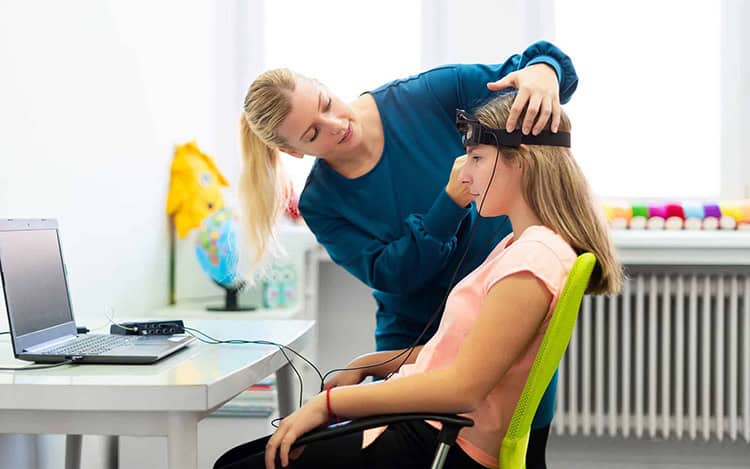ADHD assessments are an essential part of diagnosing and managing ADHD. However, conventional methods rarely go beyond addressing top-level symptoms of ADHD. In this blog, we’ll explore some of the pitfalls of typical ADHD assessments and discuss how looking at the actual neurobiology of the brain lays the groundwork for more effective treatment.
An Introduction to ADHD and Current Assessment Methods
ADHD is a common neurodevelopmental condition that affects millions worldwide, whose diagnosis and treatment have long been subjects of clinical research and practice. Despite advancements, the methods used for ADHD assessments have been mostly traditional, hovering around symptom observation and behavioral evaluations. Although useful, this approach comes with its limitations.
The standard methods for diagnosing ADHD primarily involve gathering information on a child’s behavior from sources like parents, teachers, and healthcare providers. These methods often employ ADHD screening tools and diagnostic criteria designed to measure the extent of core ADHD symptoms quantitatively. However, these tools rarely probe deeper into the neurological underpinnings of the condition.
In order to truly understand ADHD, you need to look at more than just outward behaviors like inattention, hyperactivity, and impulsivity. You also need an in-depth analysis that looks at what’s actually happening inside the brain. This understanding paves the way for a more accurate and supportive diagnosis.
Understanding the Importance of Brain Imaging in ADHD Assessments
Modern medical technology has given us the ability to peek into the brain’s workings in unprecedented ways. Brain imaging techniques, such as MRI and fMRI, allow healthcare providers to observe the active areas of the brain and pinpoint dysfunctions contributing to ADHD symptoms.
Using brain imaging in ADHD evaluations does more than just identify deficits—it provides a path forward for intervention. By pinpointing underdeveloped or overactive brain regions, interventions can be tailored to strengthen these areas, fostering an approach that addresses ADHD at its roots.
Deficit vs. Strength-Driven Models
Conventional ADHD assessments often operate within a deficit-driven model, focusing on what individuals with ADHD lack or struggle with. This perspective typically leads to a treatment program centered around stimulant medications designed to suppress symptoms. However, such medications do not address the core developmental deficits or offer lasting solutions.
In contrast, a strength-driven, medication-free approach, like the approach adopted by our team at Abbey Neuropsychology Clinic, focuses on identifying the unique strengths and undeveloped areas within an individual’s brain. Using targeted interventions, this model aims to bolster the brain’s areas affected by ADHD, aligning them more closely with those that are already well-developed. This personalized care model not only addresses core ADHD symptoms but also supports comprehensive brain development.
Transitioning from a deficit focus to a strength-centric approach can dramatically change the trajectory of ADHD treatment, making it possible to create customized, effective, and enduring solutions.
Transformative Treatment With Lasting Effects
Adopting a brain-centric approach to ADHD, grounded in neurobiology, makes it possible to create a personalized treatment plan that goes beyond providing temporary alleviation. By focusing on the root causes of ADHD and employing targeted interventions, children can experience genuine, long-term improvements.
Moreover, this method not only empowers children with ADHD to overcome challenges associated with their condition but can also help them reshape their self-perception, replacing self-doubt with confidence. Realizing their potential in a new light enables them to navigate life’s hurdles more smoothly and successfully.
As such, treatments grounded in brain imaging and neurodevelopmental understanding offer not merely a band-aid solution but a transformative journey toward fulfillment and well-being.
What to Look for in an ADHD Assessment
An advanced and comprehensive ADHD assessment should go beyond traditional scales and checklists to include an in-depth look at brain activity. This means examining:
- The regions of the brain with decreased activity
- The quality and speed of neural connections
- The overall patterns of brain activity and how they correlate with ADHD symptoms
Understanding these elements enables healthcare providers to pinpoint the specific neurological profiles associated with ADHD in each individual. This precision lays the groundwork for targeted and highly effective treatment plans.
Future-Oriented Treatment
Most conventional ADHD treatments and accommodations are designed with the present challenges in mind, often neglecting the skills and developmental milestones needed for future success. An effective ADHD assessment and treatment plan, therefore, must prepare children for adulthood, equipping them with the skills to mature and thrive beyond their condition.
Addressing the neurodevelopmental root causes of ADHD and investing in treatments that promote brain maturation ensures that individuals can navigate life without being shackled by their symptoms. Through such a comprehensive approach, lasting change is not just a possibility but an expectation.
Find a Comprehensive ADHD Assessment With Abbey Neuropsychology Clinic
For over 15 years, Abbey Neuropsychology Clinic has been leading the way in ADHD assessments, treatment, and support. Leveraging evidence-based methods and cutting-edge brain imaging, our team delves deep into understanding each child’s unique neuropsychological profile. Through personalized treatment plans, we aim to foster long-term development and growth, setting the stage for a brighter, more capable future.
Contact our team today to learn more about our ADHD assessment process.

